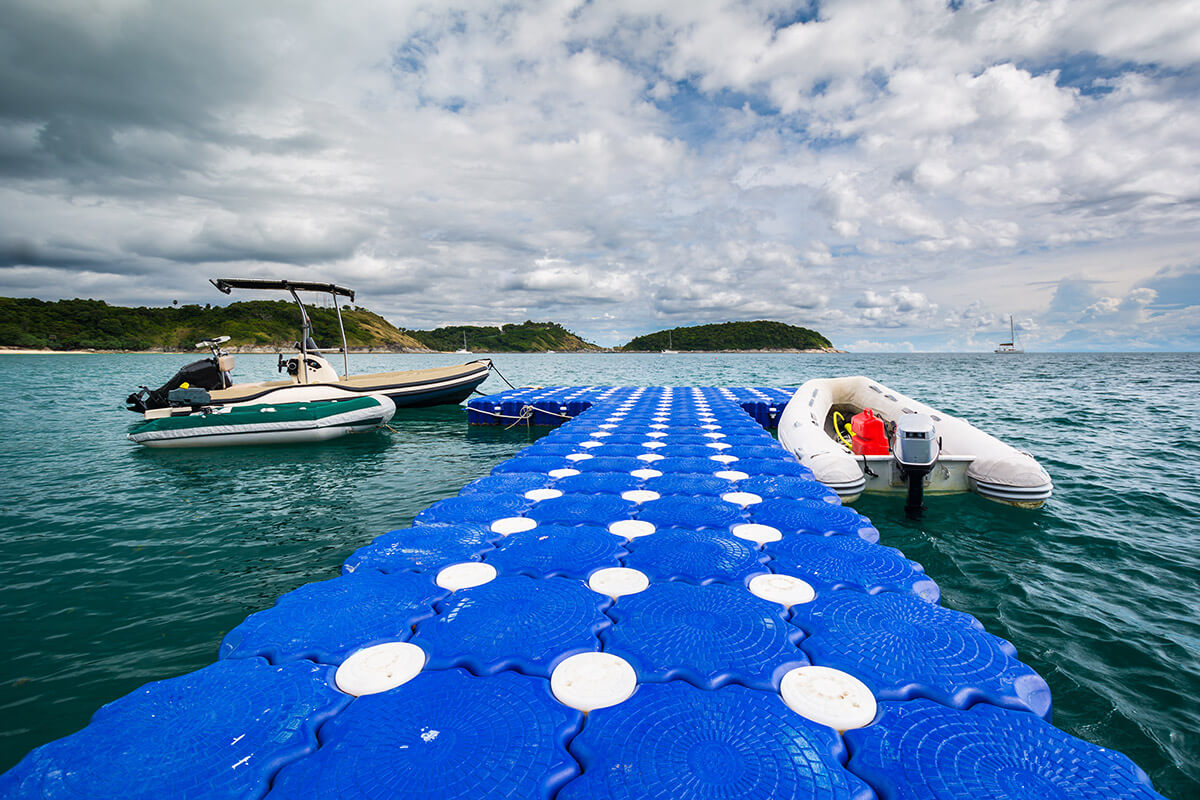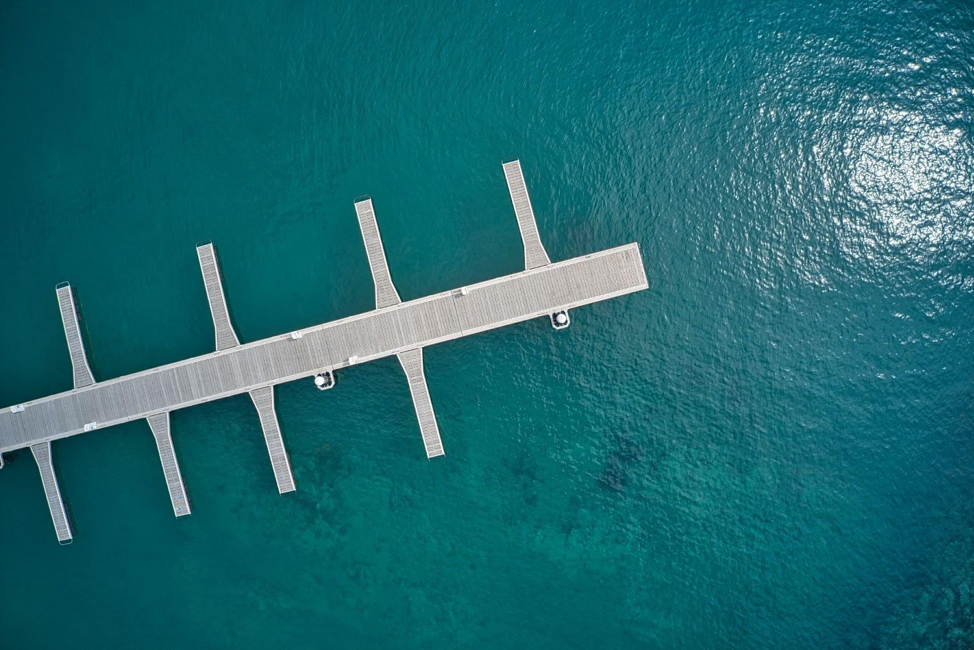Floating Docks: The Ideal Option for Versatile Water Accessibility
Floating docks present an engaging solution for a selection of water gain access to requires, providing adaptability that goes beyond traditional mooring choices. The modular nature of floating docks facilitates customization, catering to specific requirements.
Advantages of Floating Docks
Floating docks deal various advantages that improve water access for different applications. Their ability to drop and climb with transforming water levels makes them specifically useful in settings with rising and fall trends or seasonal variations. This flexibility makes certain that vessels can easily moor without concern for the water's depth, supplying a reputable platform for entertainment, business, and commercial usages.
Additionally, floating docks are frequently constructed from long lasting products that resist deterioration, making them ideal for lasting usage in marine environments. Their installation is usually less invasive than traditional fixed docks, decreasing the ecological effect and assisting in quicker release (dock company). This adaptability permits less complicated moving or reconfiguration according to customer needs or ecological changes
Safety and security is an additional vital benefit; floating docks can give stable access for people disembarking or boarding from watercrafts and decrease the danger of crashes connected with unstable surface areas. They can be created to suit a range of accessories, such as cleats and fenders, improving functionality. Overall, floating docks stand for an effective option for improving water gain access to across varied sectors while advertising safety and security and ecological sustainability.

Types of Floating Docks
Various kinds of floating docks provide to various needs and environments, each designed with specific features to maximize functionality. The most usual kinds consist of modular docks, which contain interlacing areas that permit simple personalization and expansion. These docks are optimal for leisure use, as they can be customized to fit various watercraft dimensions and water problems.
An additional popular choice is the fixed floating dock, which remains secured in position yet drifts with altering water degrees. floating dock services. This kind is specifically fit for areas with minimal tidal changes, providing secure gain access to for angling or swimming. In addition, there are drive-on docks, which include a sloped layout that allows watercrafts to conveniently drive on and off, making them suitable for individual watercraft and smaller sized vessels
For industrial applications, durable floating docks are offered, created from strengthened products to hold up against substantial tons and rough aquatic environments. Lastly, green floating docks make use of lasting materials and styles to minimize ecological effect, frequently integrating features like plants to sustain local wild animals. Comprehending the different sorts of floating docks guarantees that users can select one of the most appropriate service for their details needs.
Installation Refine Overview
An effective installment of floating docks requires careful preparation and focus to information to make certain optimal efficiency and security. The initial step involves evaluating the website conditions, including water deepness, existing, and possible challenges. This analysis educates the selection of the appropriate dock products and style tailored to the certain atmosphere.
Next, acquiring required licenses is critical, as numerous territories have guidelines pertaining to building and construction on water bodies. The setup can continue when permissions are secured. Begin by preparing the foundation, which might include anchoring systems or pilings tailored to the dock type and local conditions.
Following the foundation arrangement, construct the dock areas according to maker requirements. Make certain that all parts are safely fastened and lined up to stand up to ecological anxieties. Placement the dock in the designated area, guaranteeing it is level and secure.

Maintenance Tips and Finest Practices
After the installation process is complete, continuous upkeep plays a crucial duty in guaranteeing the durability and performance of floating docks. Normal examinations need to be performed to identify any kind of indicators of degeneration, damage, or wear - dock company. Check for any kind of loose fittings, cracks, or splitting up in the dock areas, as these can jeopardize structural integrity
Cleaning up the dock is vital to remove particles, algae, and various other accumulation that can affect its look and safety. Utilize a gentle stress clean site web occasionally to maintain cleanliness without creating damages to the surface area. Additionally, applying a safety sealer every few years can aid enhance longevity and resist environmental wear.
Take notice of the mooring lines and anchors, ensuring they are free and safe from corrosion. Replace any kind of degraded elements without delay to avoid hazards. Seasonal changes might additionally be needed; throughout extreme weather condition conditions, repositioning or strengthening the dock can prevent damages.
Applications for Floating Docks
Floating docks offer a plethora of applications, dealing with both entertainment and industrial requirements. In recreational setups, they give seamless access to rivers for activities such as boating, fishing, and swimming. Their adjustable nature enables setup in differing water levels, making sure risk-free and stable accessibility despite tidal fluctuations.
Commercially, floating docks are essential for marinas and waterfront organizations. They promote the docking of vessels, enabling effective dumping and filling of goods. Their modular style permits simple development or reconfiguration to fit changing service demands, making them suitable for boat services, scenic tour operations, or angling charters.
Furthermore, floating docks are utilized in environmental applications such as marine study and habitat restoration. They can serve as systems for clinical researches, keeping an eye on water top quality, or carrying out wild animals surveys without troubling sensitive communities.
In commercial contexts, floating docks visit this web-site are used in building projects, giving access to hard-to-reach areas for devices and employees. Their convenience, longevity, and marginal influence on the atmosphere make them an ideal option for a wide array of applications, boosting both functionality and ease of access in different water-based atmospheres.
Verdict
In verdict, floating docks represent an ideal remedy for diverse water accessibility requires, owing to their flexibility, durability, and modular design. Floating docks serve as an important property for entertainment, industrial, and ecological projects, guaranteeing dependable access to waterways and advertising sustainable practices in aquatic settings.
Floating docks present a compelling service for a variety of water gain access to requires, offering adaptability that goes beyond typical mooring options.Floating docks deal many benefits that boost water accessibility for numerous applications. Generally, floating docks represent a reliable solution for enhancing water accessibility throughout diverse sectors while promoting Read Full Article security and environmental sustainability.
One more prominent alternative is the fixed floating dock, which remains secured in location yet drifts with altering water levels.In final thought, floating docks represent an ideal remedy for diverse water accessibility requires, owing to their flexibility, sturdiness, and modular style.